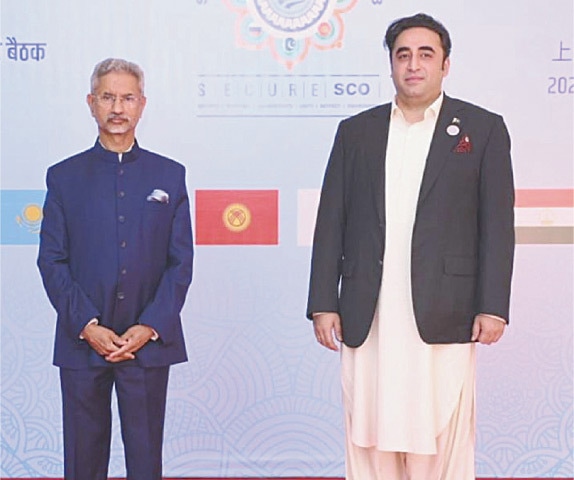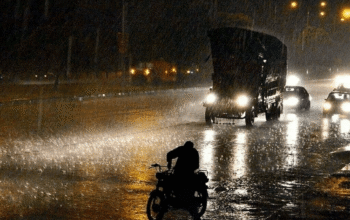By Staff Reporter
ISLAMABAD: The foreign ministers of India and Pakistan reiterated their entrenched diplomatic positions on issues such as Kashmir and terrorism, suggesting that no thaw in ties between the nuclear-armed neighboring is likely anytime soon.
The arch-rivals spoke bitterly at separate press conferences after a meeting of the Shanghai Cooperation Organization (SCO) regional bloc in the Indian coastal state of Goa.
Earlier, Indian Jaishankar and Pakistan Bhutto-Zardari posed for a protocol picture together but refrained from even shaking hands. The picture, taken on the arrival of Bhutto-Zardari, showed both leaders standing next to each other but keeping a distance. The move is being seen as a reflection of the current strained relations between the two neighboring countries.
The visit of Bhutto-Zardari to India marks the first time in 12 years that a Pakistani foreign minister has made such a trip, generating significant media interest in both nations.
Bhutto-Zardari said that despite his rare visit to India, there was no change in the status of diplomatic relations.
The minister said Pakistan could not engage in any meaningful dialogue with India until the latter reviewed its unilateral and illegal actions of August 5, 2019, revoking the special status of Kashmir.
“Unless India reviews the action it took on August 5, 2019 (abrogation of Article 370), Pakistan is not able to engage bilaterally with India… As far as Pakistan’s position on bilateral relations with India or any meaningful engagement or dialogue with my Indian counterpart, our position remains unchanged,” Bhutto-Zardari said in an interview with India Today.
“The onus is on India to create a conducive environment for talks.”
The dispute over the region of Kashmir has long been a bone of contention between India and Pakistan. Despite both countries claiming full ownership, they only exercise control over a portion of the area. In fact, two of their three wars have been fought over control of the Himalayan region.
India has consistently accused Pakistan of aiding and abetting Islamist militants who have been engaged in combat with Indian security forces in the region since the late 1980s. However, Pakistan vehemently denies these accusations and asserts that it only provides diplomatic and moral support to the Kashmiri people in their quest for self-determination.
India’s Foreign Minister, Subrahmanyam Jaishankar, responded by saying that Kashmir’s special status was “history” and suggested that Pakistan backed terrorists in Kashmir.
“Victims of terrorism do not sit together with perpetrators of terrorism to discuss terrorism,” Jaishankar said. “Victims of terrorism defend themselves, counter acts of terrorism, they call it out, they delegitimise it, and that is exactly what is happening.”
Bhutto-Zardari termed his Indian counterpart’s remarks on Pakistan as “a sense of insecurity” at a media interaction at the Karachi Airport.
“There’s nothing but insecurity behind it,” he said. “The propaganda, which he (Indian FM) is toeing being a representative of the same party which has built all this narrative, is exposed by us. They have built this narrative full of lies which club every Muslim with a terrorist.”
Bhutto-Zardari said Pakistan wanted to combat the menace of terrorism because it had caused the largest number of casualties among any other SCO countries.
“Pakistan wants to quell terrorism not because India said it or the Indian government said so, but because we want to end this menace,” the minister said.
“Pakistan has suffered the most. I am a victim of terrorism, so Pakistan and I are wholly committed to combating this menace.”
Bhutto-Zardari also stated that Pakistan was willing to engage with any Indian concerns, but India would also have to address Pakistan’s concerns.
“India will have to explain what Kulbhushan Jadhav – a state actor, a navy commander – was doing in Pakistan, carrying out terrorist attacks on Pakistani soil. Does that not come under cross-border terrorism,” he asked.
He also referred to the victims of the 2007 Samjhauta Express bombing, which had killed around 70 people, mostly Pakistanis, who had yet to see any justice.
Copyright © 2021 Independent Pakistan | All rights reserved




